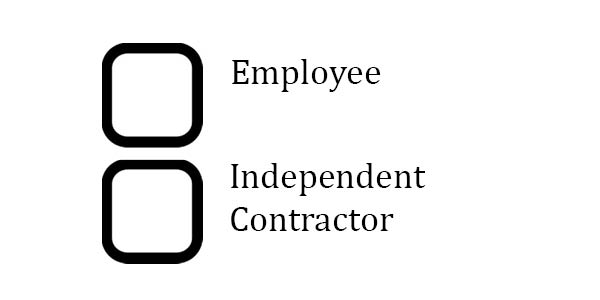
Many small businesses rely on independent contractors for their staffing needs. There are many benefits to using contractors over hiring employees: Savings in labor costs; Reduced liability; Flexibility in hiring and firing. BUT Why Does It Matter? Mis-classification of an individual as an independent contractor may have a number of costly legal consequences.
If your independent contractor is discovered to meet the legal definition of an employee, you may be required to:
- Reimburse them for wages you should’ve paid them under the Fair Labor Standards Act, including overtime and minimum wage
- Pay back taxes and penalties for federal and state income taxes, Social Security, Medicare and unemployment
- Pay any misclassified injured employees workers’ compensation benefits
- Provide employee benefits, including health insurance, retirement, etc.
So what is the IRS looking at when they determine if that new hire is truly an Independent Contractor or really an employee? Straight from IRS Revenue Ruling 87-41, here are the factors:
IRS Factor #1: Instructions. An employee must comply with instructions about when, where, and how to work. Even if no instructions are given, the control factor is present if the employer has the right to give instructions.
IRS Factor #2: Training. An employee is trained to perform services in a particular manner. Independent contractors ordinarily use their own methods and receive no training from the purchasers of their services.
IRS Factor #3: Integration. An employee’s services are integrated into the business operations because the services are important to the success or continuation of the business. This shows that the employee is subject to direction and control.
IRS Factor #4: Services rendered personally. An employee renders services personally. This shows that the employer is interested in the methods as well as the results.
IRS Factor #5: Hiring assistants. An employee works for an employer who hires, supervises, and pays assistants. An independent contractor hires, supervises, and pays assistants under a contract that requires him or her to provide materials and labor and to be responsible only for the result.
IRS Factor #6: Continuing relationship. An employee normally has a continuing relationship with an employer. A continuing relationship may exist where work is performed at frequently recurring although irregular intervals.
IRS Factor #7: Set hours of work. An employee has set hours of work established by an employer. An independent contractor is the master of his or her own time.
IRS Factor #8: Full-time work. An employee normally works full time for an employer. An independent contractor can work when and for whom he or she chooses.
IRS Factor #9: Work done on premises. An employee works on the premises of an employer, or works on a route or at a location designated by an employer.
IRS Factor #10: Order or sequence set. An employee must perform services in the order or sequence set by an employer. This shows that the employee is subject to direction and control.
IRS Factor #11: Reports. An employee submits reports to an employer. This shows that the employer must account to the employer for his or her actions.
IRS Factor #12: Payments. An employee is paid by the hour, week, or month. An independent contractor is paid by the job or on a straight commission.
IRS Factor #13: Expenses. An employee’s business expenses and travel expenses are paid by an employer. This shows that the employee is subject to regulation and control.
IRS Factor #14: Tools and materials. An employee is furnished significant tools, materials, and other equipment by an employer.
IRS Factor #15: Investment. An independent contractor has a significant investment in the facilities he or she uses in performing services for someone else.
IRS Factor #16: Profit or loss. An independent contractor can make a profit or suffer a loss.
IRS Factor #17: Works for more than one person or firm. An independent contractor gives his or her services to two or more unrelated persons or firms at the same time.
IRS Factor #18: Offers services to general public. An independent contractor makes his or her services available to the general public.
IRS Factor #19: Right to fire. An employee can be fired by an employer. An independent contractor cannot be fired so long as he or she produces a result that meets the specifications of the contract.
IRS Factor #20: Right to quit. An employee can quit his or her job at any time without incurring liability. An independent contractor usually agrees to complete a specific job and is responsible for its satisfactory completion, or is legally obligated to make good for failure to complete it.





